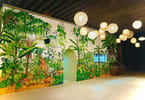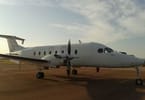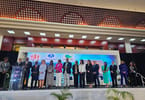At the ITB show in Berlin, Dubai’s Department of Tourism and Commerce Marketing (DTCM) confirmed its commitment to its performance-based and goal-driven initiative for sustainable tourism. The environmental program aims to reduce hotel carbon emissions by 20 percent by 2011. It was soft-launched late last year and has already enrolled a number of prominent five-star properties in Dubai.
“ITB provided an ideal platform for us to highlight to Dubai hospitality professionals, just how important green issues are to overseas tour operators. This was also apparent by the enthusiastic feedback we received from European travel industry professionals. By participating in this initiative hotels will not only protect our environment and benefit from lower utility costs, they will be seen as good corporate citizens at home and abroad,” said Sheikha Ebrahim Al Mutawa, director Environmental Committee CO2 Reduction Program.
“The travel industry is incredibly value-driven at the moment with rates being a major factor of the decision making process. By embracing sustainability initiatives, Dubai hotels can gain a competitive edge, that would undoubtedly have a positive impact on like-minded tour operators,” she added.
A detailed roadmap, with clear phases, timelines, target dates and benchmarks set to support the initiative for sustainable tourism is now communicated to all of Dubai’s hotels and hotel-apartments shortly. Hotels including Emirates Towers, Madinat Jumeirah, Movenpick Hotel and The One & Only Royal Mirage signed up.
Dubai hotels generally still lag behind their counterparts in Europe, where the average hotel produces 3,000 tons of CO2 emissions per annum. In Dubai that figure is 6,500 tons and the size of the carbon footprint produced by all hotels in Dubai, is well over 500 million kilos a year. This is equivalent to 60,000 round-trip flights between Dubai and London.
Markus Oberlin, general manager of Farnek Avireal Middle East, said: “Some hotel managers were initially concerned about the costs. In truth, by installing energy saving modules for example the return on investment is less than two years.”
“Given the challenges the industry is facing this year, supporting sustainability by reducing energy and the associated costs must be a priority for all stakeholders, it is a sound business proposition which is kind to the environment as well,” commented Oberlin.
Looking back, the first internationally-recognized and fully-protected conservation area anywhere in the Middle East was created in Dubai. Winner of the World Travel Market Conservation Award 2003, the Dubai’s Desert Conservation Reserve lies in Al Maha Desert Resort, the Emirates Group cameo hotel, 45 minutes outside the city. It was a major initiative emphasizing Emirates’ commitment to corporate responsibility and environmental protection policies. The nature reserve is at the heart of a 225-square kilometer Conservation Reserve, safeguarding nearly 5 percent of Dubai’s land and unique desert habitat.
Urgent requirement for the reserve has been thrown into sharper focus by Dubai’s remarkable rate of growth and development. Since 1980 its population has quadrupled, making it one of the world’s fastest-growing cities. By 2010, it expects 15 million visitors a year, boosting its economy but putting under threat the delicate balance between progress and preservation. The reserve will provide the firm foundations essential to managing this growth sensitively. Dubai’s environmental image will benefit from international endorsement, placing it firmly in the front row of world conservation, and acknowledging to its efforts to promote environmental good practice.
Bawadi, a destination by itself is another example. Owned by Dubai’s Tatweer, a company owned by Dubai Holding, this gigantic project is developing a quasi Las Vegas strip, but of late, construction funds became a big challenge. It has also made a commitment to sustainability incorporating green and sustainable design throughout the development. Landscape and green spaces will be used to provide a structure to the development by helping to define the boundary of the development and character areas and through providing connecting green corridors which link the character areas.
The so-called Boulevard will be a wide heavily-landscaped shopping street adapted for outdoor use throughout the year. Arterial routes will be provided with street trees to help mitigate the effects of traffic and provide a more pleasant street environment. “Bawadi will stay sustainable; in the long-term, developers will get back more than what they are saving from being sustainable. This is more attractive than being just a door and window hotel,” explained CEO Arif Mubarak.
WHAT TO TAKE AWAY FROM THIS ARTICLE:
- “Given the challenges the industry is facing this year, supporting sustainability by reducing energy and the associated costs must be a priority for all stakeholders, it is a sound business proposition which is kind to the environment as well,” commented Oberlin.
- Landscape and green spaces will be used to provide a structure to the development by helping to define the boundary of the development and character areas and through providing connecting green corridors which link the character areas.
- In Dubai that figure is 6,500 tons and the size of the carbon footprint produced by all hotels in Dubai, is well over 500 million kilos a year.






















